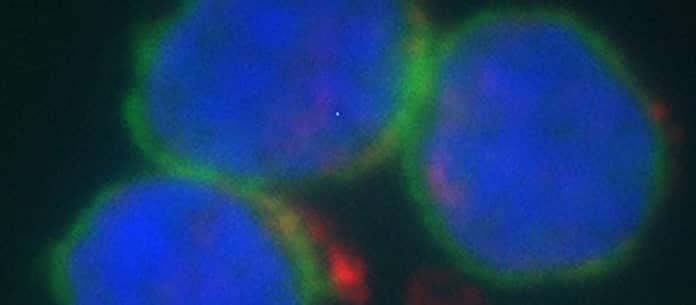Nanotechnology is helping to considerably improve, even revolutionize, many technologies and industry sectors: information technology, homeland security, medicine, transportation, energy, food safety, and environmental science, among many others.
Despite the increased use, the safety and effect on the human immune system remain an important concern, especially in medicine.
By testing a variety of gold nanoparticles, researchers at the University of Geneva (UNIGE), in collaboration with the National Centre of Competence in Research “Bio-inspired Materials” and Swansea University Medical School, (United Kingdom), are providing first evidence of their impact upon human B lymphocytes – the immune cells responsible for antibody production.
B lymphocytes play an essential role in health and disease; the suitability of GNPs as a B cell-targeting tool is of high relevance. Vaccines must reach B lymphocytes quickly without being destroyed, making the use of nanoparticles particularly interesting.
Carole Bourquin, a Professor at the UNIGE’s Faculties of Medicine and Science, who co-led this study said, “Nanoparticles can form a protective vehicle for vaccines – or other drugs – to specifically deliver them where they can be most effective while sparing other cells. This targeting also allows the use of a lower dose of immunostimulant while maintaining an effective immune response. It increases its efficacy while reducing side-effects, provided that the nanoparticles are harmless to all immune cells.”
Gold is an excellent candidate for nanomedicine due to its specific physicochemical properties. Well tolerated by the body and easily malleable, this metal has, for example, the particularity of absorbing light and then discharging heat, a feature that can be exploited in oncology.
By testing a variety of gold nanoparticles, researchers at the University of Geneva (UNIGE), in collaboration with the National Centre of Competence in Research ‘Bio-inspired Materials’ and Swansea University Medical School, (United Kingdom), are providing first evidence of their impact upon human B lymphocytes – the immune cells responsible for antibody production. The use of these nanoparticles is expected to improve the efficacy of pharmaceutical products while limiting potential adverse effects.
UNIGE researcher Sandra Hočevar said, “Gold nanoparticles can be used to target tumors. When exposed to a light source, the nanoparticles release heat and destroy neighboring cancer cells. We could also attach a drug to the surface of the nanoparticles to be delivered to a specific location. To test their safety and the best formula for medical use, we have created gold spheres with or without a polymer coating, as well as gold rods to explore the effects of coating and shape. We then exposed human B lymphocytes to our particles for 24 hours to examine the activation of the immune response.”
To effectively determine how much their nanoparticles activated or inhibited the immune response, scientists tracked activation markers expressed on the surface of B cells. When tested, none of the nanoparticles displayed adverse effects, and their influence on the immune response varies depending on their shape and the presence of a surface, polymer coating.
Martin Clift, an Associate Professor of Nanotoxicology and In Vitro Systems at Swansea University Medical School, and the project’s co-leader said, “Surface properties, as well as nanoparticle morphology, are important when it comes to the nanoparticle-cell interaction. Interestingly, the gold nanorods inhibited the immune response instead of activating it, probably by causing interference on the cell membrane, or because they are heavier.”
Bourquin said, “Uncoated, spherical particles easily aggregate and are therefore not appropriate for biomedical use. On the other hand, gold spheres coated with a protective polymer are stable and do not impair B lymphocyte function. Moreover, we can easily place the vaccine or drug to be delivered to the B lymphocytes in this coating.”
“Also, our study established a methodology for assessing the safety of nanoparticles on B lymphocytes, something that had never been done before. This could be especially useful for future research, as the use of nanoparticles in medicine still requires clear guidelines.”
The gold nanoparticles developed by the team of researchers could make it possible to deliver existing drugs directly to B lymphocytes to reduce the necessary dosage and potential side effects. Studies in patients are already being carried out for the treatment of brain tumors. Gold nanoparticles can be made small enough to cross the blood-brain barrier, allowing specific anti-tumoural drugs to be delivered directly into the cancerous cells.
The study is published in the journal ACS Nano.
